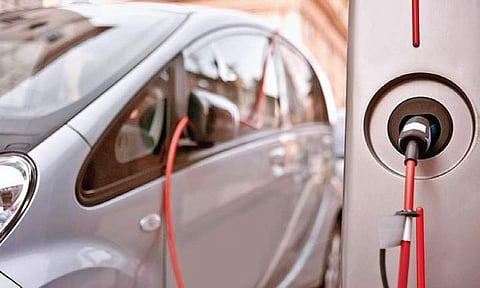

BENGALURU: Karnataka has taken the lead in India's electric vehicle eco-system network — it has the highest number of 5,765 public charging stations, which account for 23 per cent of the national total.
The state also ranks among the top three in the sale of electric vehicles (EVs), contributing to 9 per cent of India’s total sales in 2024. Karnataka recorded sales of over 1.7 lakh EV units, the maximum being two- and three-wheelers.
“This unprecedented growth in EV sales and charging infrastructure in 2024 sets a strong foundation for Prime Minister’s Electric Drive Revolution in Innovative Vehicle Enhancement (PM’s E-Drive) scheme to accelerate the shift toward a sustainable and net-zero future,” said the International Council on Clean Transportation (ICCT) report released on Friday.
Data from the Ministry of Road Transport and Highways’ Vahan Dashboard and Ministry of Power’s Bureau of Energy Efficiency showed Uttar Pradesh leading in EV sales, contributing to 19% of the national total, followed by Maharashtra at 12%. Karnataka has the highest number of public charging stations, followed by Maharashtra with 3,728 and Uttar Pradesh with 1,989.
The launch of the Rs 10,900-crore PM E-Drive scheme in October 2024 includes Rs 2,000 crore for public charging stations, to accelerate reach and usablity. While Rs 500 crore is allocated for electric trucks, the first ever to address heavy-duty transport emissions, Rs 4,391 crore is set aside for electric buses. It also allocates Rs 2,000 crore for strengthening charging infrastructure.
ICCT says the PM’s scheme will bolster Karnataka’s ecosystem. Funding for e-buses aligns with Bengaluru’s push for green public transport, and capital grants for charging stations will reinforce Karnataka’s leadership in infrastructure. It will also help Karnataka in the race to meet the net zero emission benchmark.
“EV incentive policies, including Faster Adoption and Manufacturing of Electric Vehicles in India (FAME India) and PM’s E-Drive, have been major drivers of the initial rise in EV uptake and charging infrastructure in India. The year 2025 will be crucial as India forges ahead in its transition towards clean mobility, with the potential introduction of supply-side regulations such as fuel economy standards, which is imperative for the country to achieve its climate objectives,” said Sumati Kohli, researcher, ICCT.